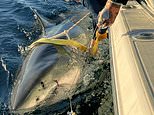Top Stories
Urgent: Record-Breaking Great White Shark Spotted Near Canada

URGENT UPDATE: The largest great white shark ever recorded is on the move, and its potential arrival at popular U.S. holiday resorts is sending shockwaves through marine communities. Named Contender, this colossal shark, measuring 14 feet and weighing 1,653 lbs, was last tracked off the coast of Natashquan, Canada, just days ago.
Contender was initially tagged by the research organization OCEARCH in January, approximately 45 miles off the Florida-Georgia coast. The shark’s tracker activated on September 29, revealing its location in the Gulf of St. Lawrence. This movement marks a remarkable journey for Contender, as researchers confirmed it has become one of the furthest northern pinging sharks recorded.
This shark is currently feasting on seals to build fat reserves for its upcoming winter migration back to Florida. Chris Fischer, the founder and expedition leader of OCEARCH, stated, “Contender is putting a lot of pressure on the seals, eating seals constantly… trying to put on some weight before he proceeds back down to Florida for the oncoming winter.”
Contender’s feeding habits are not just a survival tactic; they also play a critical role in maintaining the health of local fish populations. Fischer explained, “If the white sharks are in front of the seals putting pressure on them, they eat one-fourth as much per day.” This dynamic shows how one shark can positively influence the entire marine ecosystem.
Contender’s presence in these cold waters showcases the adaptability of great white sharks. Fischer noted that these sharks can withstand colder temperatures as long as food is available, akin to “horses in winter.” However, if food runs out, their survival is at risk.
The shark’s tracker pinged again on October 2, indicating it remains active in the northern waters. OCEARCH researchers are particularly interested in following Contender’s movements as they hope to discover the world’s first known great white shark mating site. “There’s never been a white shark mating site identified anywhere in the world in any one of the nine populations,” Fischer revealed.
With Contender being around 30 years old, researchers are keenly observing its behavior, especially as it prepares for its migration. Fischer stressed the significance of this study, as understanding male great white sharks is crucial for marine biology. He added, “These big mature males are hugely important because they can help us understand where and when mating is occurring.”
As Contender continues its journey, tracking data from its satellite tag could lead to groundbreaking discoveries in shark behavior and mating patterns. The tag is designed to function for up to five years, and Fischer is eager to see where Contender will be as spring approaches in 2026.
For now, Contender’s movements are being watched closely, and its potential migration could impact coastal areas in the southeastern United States. This unprecedented tracking may soon unlock significant insights into the life cycle of one of the ocean’s most formidable predators.
Stay tuned for further updates as OCEARCH continues to monitor this remarkable shark and its journey back to warmer waters.
-

 Politics4 weeks ago
Politics4 weeks agoSecwepemc First Nation Seeks Aboriginal Title Over Kamloops Area
-

 World5 months ago
World5 months agoScientists Unearth Ancient Antarctic Ice to Unlock Climate Secrets
-

 Entertainment5 months ago
Entertainment5 months agoTrump and McCormick to Announce $70 Billion Energy Investments
-

 Science5 months ago
Science5 months agoFour Astronauts Return to Earth After International Space Station Mission
-

 Lifestyle5 months ago
Lifestyle5 months agoTransLink Launches Food Truck Program to Boost Revenue in Vancouver
-

 Technology3 months ago
Technology3 months agoApple Notes Enhances Functionality with Markdown Support in macOS 26
-

 Lifestyle3 months ago
Lifestyle3 months agoManitoba’s Burger Champion Shines Again Amid Dining Innovations
-

 Top Stories2 months ago
Top Stories2 months agoUrgent Update: Fatal Crash on Highway 99 Claims Life of Pitt Meadows Man
-

 Politics4 months ago
Politics4 months agoUkrainian Tennis Star Elina Svitolina Faces Death Threats Online
-

 Sports5 months ago
Sports5 months agoSearch Underway for Missing Hunter Amid Hokkaido Bear Emergency
-

 Politics5 months ago
Politics5 months agoCarney Engages First Nations Leaders at Development Law Summit
-

 Technology5 months ago
Technology5 months agoFrosthaven Launches Early Access on July 31, 2025




















